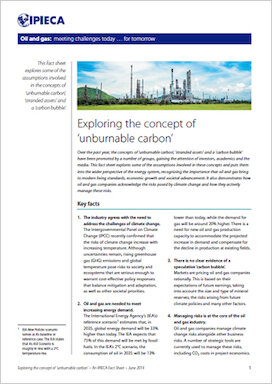Over the past year, the concepts of 'unburnable carbon', 'stranded assets' and a 'carbon bubble' have been promoted by a number of groups, gaining the attention of investors, academics and the media. This fact sheet explores some of the assumptions involved in these concepts and puts them into the wider perspective of the energy system, recognizing the importance that oil and gas bring to modern living standards, economic growth and societal advancement. It also demonstrates how oil and gas companies acknowledge the risks posed by climate change and how they actively manage these risks.
Exploring the concept of 'unburnable carbon'

15 June 2014
Share this resource
Related resources
- 12 June 2025
Ipieca works closely to support IMO work to decarbonise the maritime industry, providing technical expertise across a range of areas to identify good practices and develop industry guidance.
View
- 21 January 2019
This new fact sheet explores the scale-up and deployment of CCS in more detail and presents a series of facts about the necessary development of this technology.
View
Carbon Capture and Storage: A key technology for delivering a low-emissions world (The Paris Puzzle)
- 1 June 2015
Carbon capture and storage: A key technology for delivering a low-emissions world is one piece of the Paris Puzzle...
View
- 1 June 2015
Effective policy: The driver of results is one piece of the Paris Puzzle - a series of papers intended to address what we see as key components...
View



